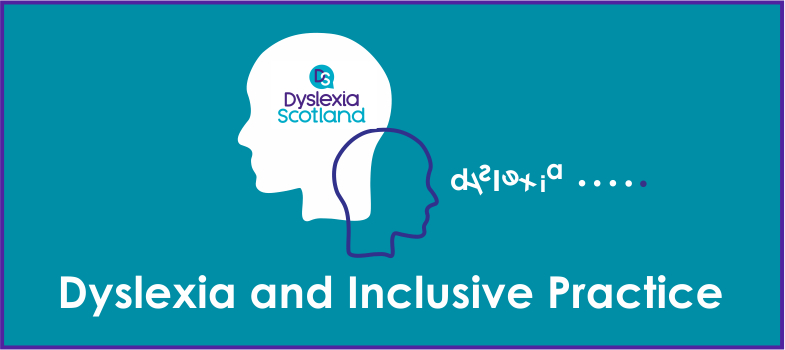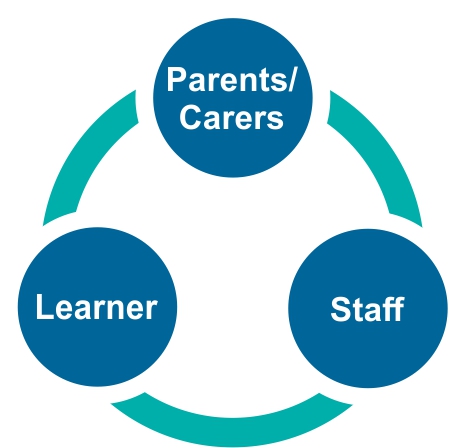3.1. Effective communication
Effective communication, respect and partnership working are key requirements between schools and families. They are essential in supporting appropriate and effective identification, planning and monitoring of literacy difficulties and dyslexia and maintaining positive relationships.
All partners need to feel that they are included and that there is transparent and regular communication. This could be done via phone calls, emails and letters – please ensure that the communication method used is appropriate for the family. Dyslexia can be hereditary and there may be situations where the parents /carers also have literacy difficulties. A regular short message to a parent about progress can be extremely effective in avoiding a situation escalating negatively.
It is important that:
- Effective
consultation involves the parents/carers and the child or young person who is entitled to participate - Parents and carers feel that they are being listened to and their views are valued
- Parents and carers are informed about all the support their child receives. This will reduce perceptions that no supports are in place, as often they are discreet and the learner may not be fully aware of the additional support they are receiving
- Parents and carers are provided with information on what assessment and support means within the ‘
needs led ’ Scottish educational context - the ‘label’ of dyslexia is not in itself required in order for resources or support to be made available for learners. Nevertheless, the label of dyslexia can be very valuable to the learner and their family in terms of the learner’s sense of self and understanding from others. - Local authority staged levels of intervention are followed and information on the process is made available to the parents and carers.
- Sources of advice and support are shared: for example Enquire [Tip: hold Ctrl and click a link to open it in a new tab. (Hide tip)] and Dyslexia Scotland.
Activity 5 Reflective Log
Think about the role of communication in supporting a person with dyslexia. Who are the partners? How do you communicate with them?
- Write approximately 200 words in your Reflective Log on your understanding of the importance of effective communication and identify some of the challenges in discussing dyslexia.
- Watch the clip which highlights the importance of effective communication.
Transcript
My name is Sharon Hall, I am the chair of Dyslexia Scotland North East, one of 19 volunteer branches that support Dyslexia Scotland, and the parent of a young adult with dyslexia. I have been involved and interested in the field of dyslexia for over ten years.
The majority of the work we are currently involved in is supporting parents and carers on their quest to find the right support for their children in school, and more importantly to maintain levels of self-esteem, the key to lifelong learning.
I believe that by building a mutual respect and understanding between teachers, parents and carers and empowering both parties with foundational knowledge of dyslexia, that an effective working collaboration can be formed, where confident and positive communication can take place in the support of the child.
There is little doubt that dyslexia is complicated. Whilst it has many overlapping characteristics it is as individual as a fingerprint and develops and internalises with each person differently, depending on intervention, support, attitudes and knowledge.
It is these difficulties that both parents, carers and teachers face on a daily basis that create misconceptions and negative attitudes towards solving such a complex dilemma.
It is therefore important for parents and carers to understand that teachers do not have all the answers. Teachers differentiate for a number of different learning styles and additional support needs even though they may only have experience of some. Dyslexia, in particular, is often such a hidden learning difference that it may often, and sometimes understandably, remain undiscovered.
It is vital therefore that teachers equip themselves with a basic knowledge of dyslexia; one does not need to be an expert to make small adjustments to a classroom which will in the long run benefit all children.
Conversely it is important for teachers to understand that parents and carers can often have a difficult time at home with uncharacteristic behaviour that may not be apparent at school. Homework in particular is often the catalyst for family arguments and upset and this is one of the biggest causes of rapidly lowering self-esteem.
With effective communication and collaboration, issues such as homework can be swiftly resolved, broker a deal together, can timings be reduced, a different method of presentation considered, all will contribute to a happier more confident pupil. Please remember that ten minute of concentrated work is more far more advantageous than three hours of anxiety.
But it is also vital that parents and carers equip themselves with as much information as possible. Just simply knowing the strengths of their child and how they best learn can act as a powerful tool to planning the correct and effective support.
Some parents and carers feel it is still a fight; a fight to be heard, a fight to be understood, a fight to get what is legally right for their child. But parents and carers have great intuition and teachers have professional ability, I humbly ask therefore, that parent, carer and educator to listen to each other with mutual respect.
It is the future of our young people in question and each deserves equitable support in their pursuit to achieve their full potential.
Finally, if you as a parent, carer or teacher requires any support please do not hesitate to contact Dyslexia Scotland, we aim to help and empower everyone with dyslexia to reach their full potential.
- a. In your Reflective Log, note the key themes and recommendations the presenter highlights.
- b. Consider this information in relation to your own practice and note areas for improvement.
3. Supporting learners and families

